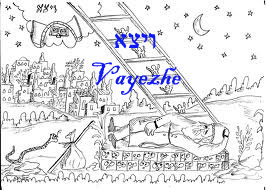Portion Va'yezhe

When Jacob was about to leave the land of Israel to Charan, before he came to the house of Eiver (Yeshivah of Eiver), and invested himself fourteen years studying Torah. Then, when he came to Mount Moriah and went to bed there, the Torah says: "lie down in that place". The Midrash interprets: "Here lie, but during the fourteen years in the Yeshivah of Eiver - did not lie."
Even while in Lavan's house did not sleep at night, says the Midrash: "Every twenty years was the home of Lavan – did not lie". What he did these nights? This question asks the Midrash: "What would say at night? Responds: "he said 15 songs of "Shir Hamaalot" in the book of Psalms".
What is the question of alleged midrash "What he did at night," After all, Jacob was busy keeping cattle of Lavan? But, of course Jacob did not give his soul for twenty years to keep the Lavan's sheeps. He had a deep inner intent - is to find out sparks of holiness inherent in material things of Lavan.
The question of the Midrash is: which force Jacob can do this job - to find out sparks of holiness? Staying in Lavan's house involved in many spiritual efforts, and was a danger that Jacob will decrease. Actually did not drop his step not only that, he also finds out sparks of holiness that were in Lavan, and returned to Israel with a large property. What power did this?
The Midrash says, that Jacob drew his strength from the "Song of degrees ... where will my help come." This hymn expresses the sense of man's complete putter, feels that his own has no option to work, and strength come from G-d. Sense of 'nothing' in this, one feels that he is zero, it leads him to put his faith in G-d alone - "My help comes from G-d."
Verse adds: "made heaven and earth." That is, G-d is the owner and gives power, between for 'heaven', things are superior (Torah learned in Eiver's Yeshiva), and for 'earth', the lesser things (dealing with Lavan in Haran, Haran means in Hebrew: the fierce anger's G-d on the world because this place). This recognition that G-d is the owner and source of power - it helps a person in his work.
Details of the story of Jacob teaching every Jew's life: To succeed in the work of find out sparks of holiness inherent in material things, start the day when you're completely in the Torah and prayer.
The preoccupation that followed the Torah and prayer, world affairs, should be in a "labor of your hands (not the head) - just the 'hands', the external forces, have to invest in world affairs, but on the head, should be kept. When a Jew also deals with business, the head should be engaged in Mishnah, in Tanya, reciting psalms and the like. This method ensures that the Jews, G-d's blessing for success even physically, as it is written with Jacob: "Jacob was very successful very much."